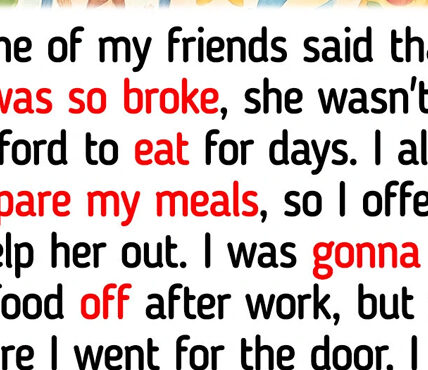Grandma kept calling, worried I wasn’t locking my windows at night. “People notice when you live alone,” she warned. I laughed it off, but promised to be careful. One morning she left a bag of fresh bread at my door. I picked it up, turned to go back inside, and froze—my living room window was open. Again.
It wasn’t wide open, just nudged a few inches. But I knew I’d shut it. I’d shut every window the night before—Grandma’s voice had been ringing in my ears, after all. Still, I convinced myself it must’ve been the wind. I was living in a small town just outside Missoula, in a creaky old duplex with original windows and no screens. Maybe the latch was loose.
But it didn’t feel right.
The next day, I stuck a piece of tape across the window and the frame, so if it opened, the tape would tear. When I got home from work—no tear. Everything looked fine. I told myself I was being paranoid, and went back to living like usual. Except now I double-checked every lock before bed. I even started sleeping with one of those tiny motion sensors by the front door.
Two weeks later, it happened again.
Same window. Just barely cracked open. And the tape? Cleanly peeled off and folded into a little square, sitting neatly on my kitchen counter like someone was mocking me. That’s when I stopped laughing.
I called Grandma, trying not to sound shaken. She offered to come stay with me, but she’s 78 and walks with a cane. What would she do if someone actually broke in? I told her no, just hearing her voice was enough. I could handle it.
The next day I installed a camera in the living room. Not a fancy one—just a little one I got from a coworker. It ran on batteries and sent footage to an old phone I had lying around. I positioned it so it faced the window, hidden behind a houseplant.
That night, I locked everything. Triple-checked. Made tea. Sat on the couch with a blanket and tried not to stare at the window.
Morning came. No window movement. No sign of anything.
I checked the footage. Nothing.
Then three nights later, it happened.
The camera caught someone.
Not their face—just a silhouette, crouched by the window. The timestamp said 2:17 a.m. They used something thin to slide under the latch, nudged the window up, and climbed in. Calmly. Like they’d done it before.
They didn’t take anything. Just walked around for a few minutes, picked up the tape I’d left again, and left it on the kitchen table. Then left the way they came.
I watched the footage three times, heart pounding.
The figure wore a hoodie, hood up. Broad shoulders. Moved slow. Too tall to be any of the neighborhood kids. I took the footage to the police, but they said without a clear face or an ID, they couldn’t do much. They told me to stay elsewhere for a while.
So I packed a bag and went to Grandma’s.
Her house smells like lavender and old wood. She still uses the same kettle from the 1960s. That first night, I sat at her table with a mug of chamomile, still shaking a little.
“You weren’t wrong,” I said. “Someone really was coming in.”
She nodded like she already knew.
“You think it’s someone I know?” I asked.
She didn’t answer. Just tapped her nails against the mug. Her eyes were on the back door, which she always kept locked with two bolts and a chair against the handle.
“Grandma,” I said again. “You think it’s someone I know?”
“I think,” she finally said, “someone’s watching you too close. Someone who knows your patterns.”
That sent a chill through me.
The next morning, I called work and said I’d be taking some time off. They were understanding. I’d been at the local library for five years, so I had some leave built up. I told them it was for “family stuff,” which wasn’t a lie.
Over the next few days, I stayed close to Grandma’s, helping her with chores, fixing the hinges on her back gate, walking with her to the corner store. I slept better than I had in weeks.
But I couldn’t stop thinking about that silhouette. The way they moved. The casualness of it.
I decided to go back to my place—not overnight, just during the day. I figured I’d grab a few more things, maybe look around for anything that felt off.
The place was cold and quiet. Nothing broken, nothing moved. Except the bread Grandma had left me the morning of the first break-in—it was still on the counter, stale now, with one bite missing.
I hadn’t taken a bite.
I stared at it for a long time.
On a hunch, I checked the pantry. Nothing obviously missing. But something felt… rearranged. I used to keep the sugar on the bottom shelf. It was now on the second.
I checked the fridge. My little bottle of almond milk was half-empty. I hadn’t even opened it yet.
Someone hadn’t just broken in.
Someone had been staying there.
I stood frozen, heart in my throat. Then I turned on my heel and ran back out the door, locking it behind me.
I told Grandma everything when I got back. She sat silently for a long time, then stood up and went into the back room. When she returned, she handed me an envelope.
Inside was a photo.
Me. Around ten years old. Standing next to a boy a little older, maybe twelve. We were on a swing set.
“I’ve never seen this,” I said.
“You have,” she replied. “You just forgot.”
The boy, she explained, was my cousin Adrik. He’d lived with us for a summer when I was little, after his mother lost custody. My dad’s side of the family—chaotic people we hadn’t seen in decades. She told me he’d been troubled even then, stealing small things, talking to people who weren’t there. The adults didn’t know what to do with him.
I only remembered fragments—a whisper in a closet, a missing bracelet, a toy chewed up and hidden under the porch.
“He’s been in and out of institutions,” Grandma said. “But I heard from your father that he got out last year. Nobody’s seen him since.”
Something clicked. The way the silhouette had moved. The casualness. The almond milk. That was my favorite. When we were kids, I used to sneak him sips from the fridge.
I didn’t want to believe it. But it made sense in a way nothing else did.
The next day, I called the police again, gave them Adrik’s name. They took a report but said without evidence he’d been there, they still couldn’t do much. I went back to the duplex one last time to get more footage off the camera. But when I walked in, the camera was gone.
Just gone.
That night, I sat on Grandma’s porch with a flashlight and a cold can of ginger ale, trying to stay calm. I felt like I was being watched. Every car that passed made my skin jump.
A week went by. Then two. Nothing happened.
Then Grandma’s dog started barking at the shed.
It was around 3 a.m. I bolted out of bed, grabbed the flashlight, and met Grandma by the back door. We both heard it—the shuffle of feet behind the shed, the snap of a twig.
I called 911 as we stood behind the screen door, flashlight trained on the yard.
By the time the cops came, whoever it was had vanished. But this time, they found something. A sleeping bag stuffed in the corner of the shed. A half-eaten granola bar. A child’s drawing—stick figures holding hands. One was labeled Me. The other said Cousin.
They dusted for prints, and two days later, the officer called.
“It’s Adrik,” he said. “We’ve got a match.”
They didn’t find him right away, but now they had a warrant. They circulated his photo. A week later, someone spotted him behind an old auto shop three towns over.
He was arrested without incident. He’d been squatting in different places, following me on and off for months. He didn’t hurt anyone. Didn’t steal more than food. But he’d clearly unraveled.
They got him help. Not jail—treatment. Intensive psychiatric care.
I didn’t press charges.
It’s been nine months now.
I moved. Found a little rental further north, near Kalispell. Grandma’s fine, though she still double-bolts every door. And I still check my windows every night.
But I’m okay.
I think about Adrik sometimes. I wonder what could’ve happened if someone had stepped in earlier, back when we were kids. If someone had really seen him.
Some people said I should’ve thrown the book at him. But honestly? I was never afraid of Adrik. Not really. I think he came back looking for connection. Familiarity. A memory of something that felt safe.
That doesn’t excuse what he did. But I hope—God, I hope—that getting caught finally got him the help he needed.
If there’s one thing I learned, it’s that the people who seem the scariest aren’t always evil. Sometimes they’re just broken in ways we can’t see.
So lock your windows. Trust your gut. But also—try to see the whole picture.
Sometimes the threat is just a person who got lost too young and never found the road back.
If this story hit you somewhere deep, give it a like or share it with someone who needs to hear it.


